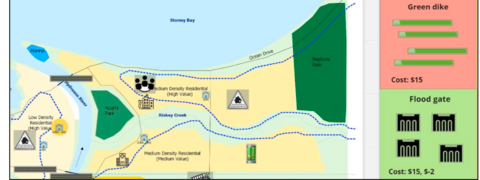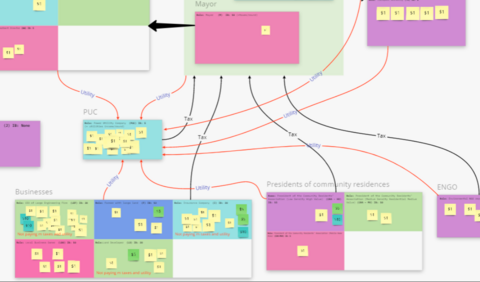The Flood Resilience Challenge © serious game is continuing to pick up momentum even after Dr. Evalyna Bogdan completed her postdoctoral fellowship at the University of Waterloo (2019-2021). The goal of the FRC game is to strenghthen stakeholder capacity for collective decision-making and was part of Dr. Bogdan’s postdoctoral research on Building Capacity for Difficult Conversations on Flood Risk Management in Canada’s Communities. Evalyna, an environmental and disaster sociologist with expertise in adult education and community engagement, co-designed the game with Heather Murdock, a hydrotechnical engineer who will be starting her PhD at the University of Potsdam in October. The research tested the effectiveness of the FRC game as an educational and engagement tool through the following objectives:
1. Increasing flood literacy;
2. Fostering social learning; and
3. Creating a safe space for exploring risk management and communication strategies.
Around the world, flooding is a significant challenge to tackle due to the combination of climate change extremes, land use change, and stakeholders’ demands to be included in decision-making. Local communities aiming to build flood resilience often grapple with balancing competing interests and deciding which trade-offs are tolerable. The power differentials between stakeholders means that some have more resources such as finances, knowledge, and social influence. Consequently, there is an uneven ‘playing field’ in decision-making, having a voice, and even vulnerability to flooding.
Serious games are one approach to bringing together diverse stakeholders to interact and learn about the complexity of flooding and flood risk governance. Serious games are games that serve a purpose other than just entertainment such as education. Despite being a serious game, the Flood Resilience Challenge (FRC) game is fun and participants can explore innovative ideas and diverse views by playing a role they are unfamiliar with by “stepping into someone else’s shoes”. By better understanding other’s roles and responsibilities, as well as constraints they face, can lead to more willingness to collaborate. The setting is the fictional town of Hydrason rather than an actual jurisdiction which creates a safe space to think outside of the box.
Although there are several serious games on flooding, the FRC game provides a combination of unique features:
- Additional content to enhance flood literacy
- Tailored to the Canadian context (including regulations)
- Game play includes policy objectives, trade-offs, and values
- Financial component with payments (e.g., insurance and taxes)
- Socio-political dynamics (e.g., voting)


(Left) A partial depiction of the Miro gameboard and flood management measures are shown. (Right) A screenshot of the financial component of the FRC game. (Photo Credit: Bogdan, 2021)
The FRC game was initially developed for decision-makers involved in flood risk management and a simplified version was later developed and piloted for a public engagement session on climate change and flooding in Sechelt, BC. Faculty, staff, and students at the University of Waterloo and Brock University have also played the in-person and/or the online version of the game. The successful adaptation and implementation of the FRC game were made possible through the collaboration of the FRC Team (includes Sina Golchi and Shaieree Cottar) as well as Erica Crawford at Shift Collaborative and employees of the District of Sechelt, BC, and the Fraser Basin Council. Participants said the following about the game:
- Enabled self-reflection of how prepared own municipality or community is, which further enabled planning next steps.
- A Public Engagement Tool - a community gathering around the [FRC] game potentially before the conversations, to try and build that empathy and understanding in that sphere.
The FRC game is gaining momentum. Next Steps are:
- In October 2021, the FRC game will be one of the feature activities at the International Symposium on Technology and Society (ISTAS)
- In November, the FRC game will be played by members of the Climate Change Committee of the Regional Public Work Commissioners of Ontario (RPWCO) as a way to position the FRC game to assist municipalities in reaching their flood risk management and climate change adaptation goals.
- In Winter 2022, the FRC game will be incorporated into an engineering course (100+ students, available to multiple disciplines) at the University of Waterloo, funded by the Learning Innovation and Teaching Enhancement (LITE) Seed Grant.
For more information, visit frcgame.com.